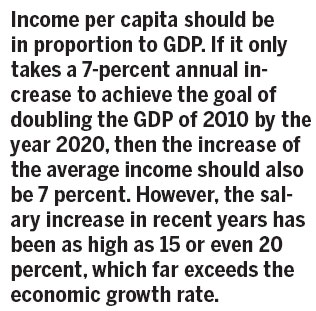Mainland wage increases hasty
Updated: 2013-04-20 06:36
By Eddy Li(HK Edition)
|
|||||||||
In recent years, the central government has tended to increase the national income, in order to improve people's lives and enable everyone to share in the achievement of the country's economic development. The intention, admittedly, is good, but whether companies are able to afford such endeavor is a practical problem for us to consider.

Take the cases of Hong Kong enterprises in the Pearl River Delta for example. This year, the minimum wage was increased again, between 15 to 20 percent. The minimum monthly salary in Shenzhen has been increased to 1,600 yuan ($259), the highest on the mainland; Guangzhou is 1,550 yuan, and Dongguan 1,310 yuan. Even cities such as Zhuhai, Foshan and Zhongshan have seen remarkable salary increases up to 20 percent. However, enterprises suffering in the adverse business environment with lower overseas orders are now faced with over-hasty pay increases which are worsening their well-being. Gradually, these enterprises will be forced to wind up or relocate, which means workers will lose their jobs and the country's economy will be harmed.
We can see some disastrous effects already. Dongguan - a city with many Hong Kong companies - had 8,000 Hong Kong-funded factories according to conservative estimates at its peak. That has now dropped to only 6,000. The main reason lies in the fact that many companies could no longer afford the spiraling economic costs and were forced to close down or relocate. At the moment, some local governments in Dongguan have already run up expenses and are in need of help from the city government.
Income per capita should be in proportion to GDP. If it only takes a 7-percent annual increase to achieve the goal of doubling the GDP of 2010 by the year 2020, then the increase of the average income should also be 7 percent. However, the salary increase in recent years has been as high as 15 or even 20 percent, which far exceeds the economic growth rate.

This is just like a domino effect - a slight move in one part may affect the situation as a whole. The increase of minimum wage standards represents the average salary increases locally. And a dramatic increase in salary will lead to a substantial increase in the costs of other aspects in the commercial chain, pertaining to raw material supply and merchandise sales. This chain reaction creates a less-than-healthy situation in which the increase in business cost is much faster than inflation and economic growth.
According to some Hong Kong enterprises on the mainland, the gloomy economic environment in Europe and the United States will restrain export orders this year. Furthermore, if the economic community is formed by the 10 countries in the Association of Southeast Asian Nations (ASEAN) in 2014 or 2015, it means that by then the free flow of goods, services, capital and labor will be actualized, threatening the position of the Chinese mainland as a manufacturing power.
Under these circumstances, if the minimum wages continue to rise - which will soon be as high as Hong Kong's levels at this speed - how competitive can the mainland manufacturing industry expect to remain?
The author is the vice-president of the Chinese Manufacturers' Association of Hong Kong
(HK Edition 04/20/2013 page1)